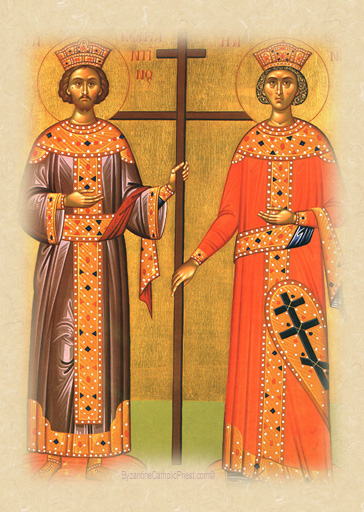Which is more important: saving the world or saving your soul?Gal.2:16-20;
Mark 8:24b-38. The Sunday after the Exaltation of the Holy & Life-Creating Cross. The Holy & Great Martyr Euphemia.
Return to ByzantineCatholicPriest.com. |
12:31 PM 9/16/2012 — The readings presented to us on the Sunday following the feast of the Exaltation of the Cross are much like those for the Sunday before in that they have a bearing on the mystery of the Cross in our lives: “Whosoever will come after me, let him take up his cross and follow me.” And I would offer for your meditation today a very simple point taken from our Lord’s interesting choice of words: “...let him take up his cross...”; not just any cross, but his own cross. In other words, the cross we are to take up is not a cross of our own choosing, but one given especially for us.
Now, this doesn’t require a whole lot of mental gymnastics to figure out. All we have to do is look at our lives and list all the things that cause us pain, and it’s very clear that we didn’t choose them for ourselves, whatever those problems may be.  It could be some marital difficulty or problem with a child or something to do with money or some chronic physical illness, or anything at all; it’s a sure bet we didn’t choose it for ourselves. It’s not like some so-called cross that we choose for ourselves, either out of conviction or out of vanity, like the person who decides he or she is going to be a vegetarian: it’s not something someone imposed upon him; it’s something he chose for himself, either because he strongly believes something about something, or, as is more often the case, he wants to think of himself as someone who believes something about something, and letting everyone see that makes him feel good about himself. And it’s very easy—and not totally unjustified—for those of us with real problems to look a little disdainfully on those who choose vanity crosses for themselves, since we know that they wouldn’t choose a vanity cross if they actually had a real cross to vex them. It could be some marital difficulty or problem with a child or something to do with money or some chronic physical illness, or anything at all; it’s a sure bet we didn’t choose it for ourselves. It’s not like some so-called cross that we choose for ourselves, either out of conviction or out of vanity, like the person who decides he or she is going to be a vegetarian: it’s not something someone imposed upon him; it’s something he chose for himself, either because he strongly believes something about something, or, as is more often the case, he wants to think of himself as someone who believes something about something, and letting everyone see that makes him feel good about himself. And it’s very easy—and not totally unjustified—for those of us with real problems to look a little disdainfully on those who choose vanity crosses for themselves, since we know that they wouldn’t choose a vanity cross if they actually had a real cross to vex them.
But it is interesting to me that people without real problems in their lives still feel compelled to find some. Why is it, for example, that it’s only here, and in other parts of the industrialized world,—i.e., any country in which people drive cars and own iPhones—that we have people embracing causes like protesting the government to tell the truth about UFOs, or railing against global warming or the destruction of the rain forest? You don’t see that in the poorest countries of the world, where people are concerned with where the next meal is coming from; they have real problems with which to contend; they don’t need to make them up. It’s almost as if there is something in the human psyche that requires suffering, and if we don’t have a real problem to suffer, then we’ll make one up.
Malcolm Muggerige summed it up very concisely. He was an atheist and a journalist who was assigned to cover the life and work of Mother Theresa, and in the course of doing so, he found the gift of faith and ended up entering the Catholic Church. He said that when people stop believing in God they don’t then believe in nothing; they make up something else to believe it. It could be a political agenda or a social agenda or some form of pagan mysticism, but everybody needs to give themselves to something, and they have to reinforce that they’ve given themselves to something by imposing on themselves some form of personal privation or performing some sort of counter-cultural penance. So, they’ll go on hunger strikes for this cause or that, they’ll march in protest against this, that or whatever, or they’ll latch onto some kind of far-eastern mysticism that promises enlightenment. And the only reason they do this is because either they don’t have any real problems in their lives, or the problems they have they’ve chosen to simply run away from.
Those of us who have real problems and who face them are the ones who remain attached to a real God-given faith, because, even though we know that embracing the faith doesn’t solve our problems, it does give us a way to cope and keep things in perspective. That’s why we don’t run away from our problems, nor try to mask them with imaginary ones. We accept our crosses precisely because they are ours, and not someone else’s, and because embracing them is the path to salvation. Or, as our Lord put it in today’s Gospel: “...whosoever will save his life shall lose it; but whosoever shall lose his life for my sake and the gospel’s, shall save it.”
Father Michael Venditti
|

